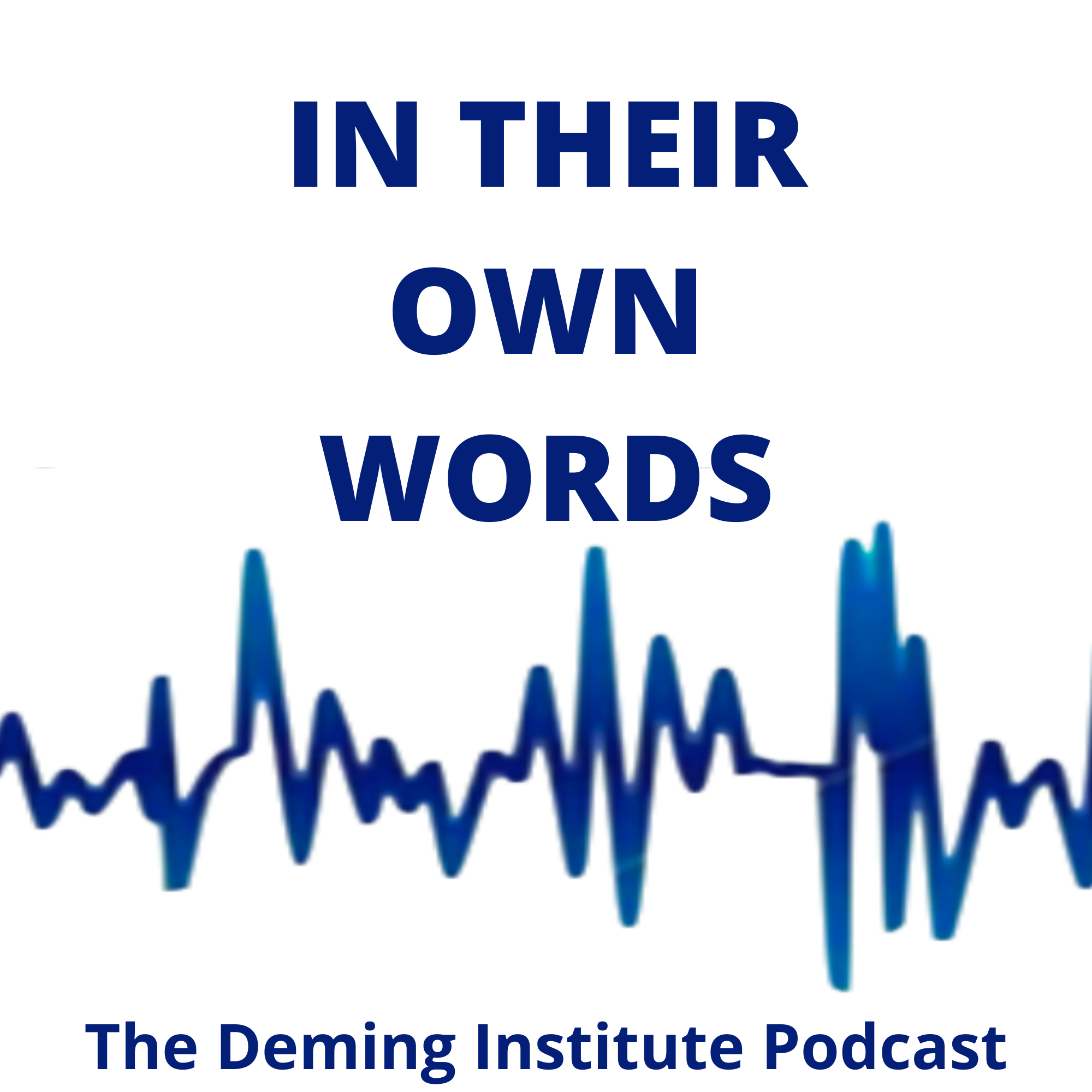

In Their Own Words
The Deming Institute
Interviews with members of The Deming Institute community, including industry leaders, practitioners, educators, Deming family members and others who share their stories of transformation and success through the innovative management and quality theories of Dr. W. Edwards Deming.
Episodes
Mentioned books

Oct 28, 2024 • 31min
Myth of Tech Omnipotence: Boosting Lean with Deming (Part 6)
Join Jacob Stoller, a Shingo Prize-winning author and expert on Lean management, as he reveals the pitfalls of over-relying on technology in productivity. He explores the myth of tech omnipotence, sharing tales of companies that succeeded through process improvement rather than tech-only solutions. Stoller emphasizes the role of human resources in automation challenges and critiques the hype surrounding autonomous technologies and AI. He advocates for a Lean approach to automation that prioritizes process enhancements before incorporating tech, ensuring sustainable performance.

18 snips
Oct 21, 2024 • 39min
Myth of Sticks and Carrots: Boosting Lean with Deming (Part 5)
Jacob Stoller, a Shingo-Prize winning author, discusses the inadequacies of traditional management's reward and punishment methods. He challenges the myth of 'sticks and carrots,' arguing for intrinsic motivation as a more effective driver of employee engagement. The conversation delves into the importance of creating a supportive work environment, contrasting motivational approaches across cultures, and the vital role of personal growth in boosting productivity. Stoller emphasizes Dr. Deming's human-centric principles, advocating for collaboration over competition in the workplace.

12 snips
Oct 14, 2024 • 21min
Top-Down Knowledge Myth: Boosting Lean with Deming (Part 4)
Jacob Stoller, a Shingo-Prize-winning author and lean management expert, discusses the top-down knowledge myth. He unpacks the idea that managers don't need to know everything to boost productivity. Jacob shares a real-world example from a workshop that highlights how frontline workers possess untapped knowledge. He stresses the need for managers to shift from directors to coaches, fostering trust and collaboration. The conversation reveals how feedback-rich environments enhance quality and sustain lean transformations.

Oct 3, 2024 • 35min
Category and Continuum Thinking: Misunderstanding Quality (Part 6)
Bill Bellows, a dedicated advocate of Dr. Deming's quality principles, discusses the intricate relationship between acceptability and desirability in consumer choices. He shares personal anecdotes about loyalty to brands like Toyota, contrasting them with experiences of American brands. The conversation delves into the flaws of category thinking, advocating for continuum thinking as a richer perspective. This approach encourages listeners to rethink biases tied to quality and decision-making, ultimately fostering deeper insights into customer trust and satisfaction.

11 snips
Sep 23, 2024 • 25min
Myth of the Bottom Line: Boosting Lean with Deming (Part 3)
In this discussion, Jacob Stoller, a Shingo Prize-winning author and expert on Lean management, delves into the myth that financial metrics alone reflect organizational productivity. He stresses the importance of non-financial factors and critiques traditional accounting methods. Stoller emphasizes the disconnect between executives and operations, advocating for a holistic approach to productivity that fosters collaboration and long-term success. He also shares insights from a high-performing factory, highlighting the value of team responsibility and transparency.

16 snips
Sep 16, 2024 • 27min
The Myth of Segmented Success: Boosting Lean with Deming (Part 2)
Join Jacob Stoller, a Shingo Prize-winning author known for his insights on Lean management, as he unpacks the myth of segmented success. He discusses the pitfalls of traditional corporate structures, highlighting how competition between departments can harm overall success. Stoller shares a compelling case study illustrating the benefits of collaboration over individual quotas. He emphasizes the need for joy in work, how integrated management can enhance creativity, and the importance of unlearning outdated practices to foster a more cohesive and productive environment.

Sep 9, 2024 • 40min
The Red Bead Experiment: Misunderstanding Quality (Part 5)
In this discussion, Bill Bellows, a seasoned expert in applying Dr. Deming's ideas, dives into the Red Bead Experiment to unpack misconceptions surrounding quality. He highlights the critical differences between acceptability and desirability, advocating for a shift from mere inspection to embedding quality in processes. The conversation touches on healthcare choices, emphasizing the ongoing need for improvement in service systems. Bill also underscores the importance of fostering a culture that prioritizes continuous enhancement over assigning blame.

16 snips
Aug 26, 2024 • 38min
Setting the Challenge: Path for Improvement (Part 2)
John Dues, a forward-thinking educator, dives deep into improving chronic absenteeism in schools. He discusses a new improvement model, emphasizing ambitious goals and the vital role of stakeholder involvement. The conversation highlights creative solutions for student transportation and the significance of understanding the voices of families and students. With a staggering 52% absenteeism rate at stake, Dues shares compelling strategies and community initiatives designed to enhance attendance and promote a joyful learning environment.

38 snips
Aug 19, 2024 • 35min
Pay Attention to the Choices: Misunderstanding Quality (Part 4)
The conversation dives into the contrast between acceptability and desirability in decision-making. It unpacks how systems thinking affects everyday choices, like shopping, by promoting a broader quality understanding. The speakers share insights from Japanese companies to illustrate quality management shifts. Logistical challenges in operations highlight the need for better communication and trust. They also discuss the significance of 'handoffs' in business, emphasizing the value of feedback and quality awareness for sustained success.

26 snips
Aug 12, 2024 • 22min
5 Myths of Traditional Productivity: Boosting Lean with Deming (Part 1)
Jacob Stoller, a Shingo prize-winning author and expert on Lean management, delves into the myths surrounding traditional productivity. He shares his evolution from sales to Lean journalism, emphasizing the human element in Lean practices. The conversation highlights the resistance organizations face when adopting these principles, particularly from management. Stoller challenges misconceptions that resource cuts equal better profits, advocating for a deeper understanding of interdependence and continuous improvement in productivity strategies.


